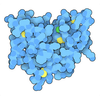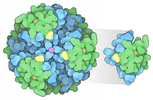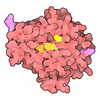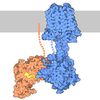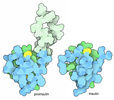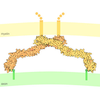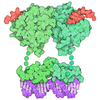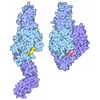[English] 日本語
 Yorodumi
Yorodumi- PDB-8rgg: Structure of dynein-2 intermediate chain DYNC2I2 (WDR34) in compl... -
+ Open data
Open data
- Basic information
Basic information
| Entry | Database: PDB / ID: 8rgg | ||||||||||||||||||||||||||||||
|---|---|---|---|---|---|---|---|---|---|---|---|---|---|---|---|---|---|---|---|---|---|---|---|---|---|---|---|---|---|---|---|
| Title | Structure of dynein-2 intermediate chain DYNC2I2 (WDR34) in complex with dynein-2 heavy chain DYNC2H1. | ||||||||||||||||||||||||||||||
 Components Components |
| ||||||||||||||||||||||||||||||
 Keywords Keywords | TRANSPORT PROTEIN / dynein / cilia / intraflagellar transport / complex | ||||||||||||||||||||||||||||||
| Function / homology |  Function and homology information Function and homology informationMGMT-mediated DNA damage reversal / nitric-oxide synthase inhibitor activity / deoxyribonuclease inhibitor activity / negative regulation of DNA strand resection involved in replication fork processing / negative regulation of phosphorylation / intraciliary retrograde transport / visual behavior / methylated-DNA-[protein]-cysteine S-methyltransferase / methylated-DNA-[protein]-cysteine S-methyltransferase activity / 9+2 motile cilium ...MGMT-mediated DNA damage reversal / nitric-oxide synthase inhibitor activity / deoxyribonuclease inhibitor activity / negative regulation of DNA strand resection involved in replication fork processing / negative regulation of phosphorylation / intraciliary retrograde transport / visual behavior / methylated-DNA-[protein]-cysteine S-methyltransferase / methylated-DNA-[protein]-cysteine S-methyltransferase activity / 9+2 motile cilium / cilium movement involved in cell motility / intraciliary transport / dynein light chain binding / spinal cord motor neuron differentiation / dynein heavy chain binding / Activation of BIM and translocation to mitochondria / embryonic skeletal system morphogenesis / motile cilium assembly / DNA-methyltransferase activity / ciliary tip / Intraflagellar transport / negative regulation of nitric oxide biosynthetic process / protein localization to cilium / coronary vasculature development / DNA alkylation repair / positive regulation of smoothened signaling pathway / non-motile cilium assembly / ciliary plasm / dorsal/ventral pattern formation / dynein complex / COPI-independent Golgi-to-ER retrograde traffic / embryonic limb morphogenesis / determination of left/right symmetry / microtubule motor activity / minus-end-directed microtubule motor activity / dynein light intermediate chain binding / cytoplasmic dynein complex / microtubule-based movement / Macroautophagy / positive regulation of double-strand break repair / ciliary base / forebrain development / Golgi organization / pericentriolar material / dynein intermediate chain binding / cytoskeletal motor activity / tertiary granule membrane / ficolin-1-rich granule membrane / axoneme / cilium assembly / spermatid development / enzyme inhibitor activity / positive regulation of insulin secretion involved in cellular response to glucose stimulus / Hedgehog 'off' state / COPI-mediated anterograde transport / Amplification of signal from unattached kinetochores via a MAD2 inhibitory signal / axon cytoplasm / Loss of Nlp from mitotic centrosomes / Loss of proteins required for interphase microtubule organization from the centrosome / centriole / Mitotic Prometaphase / Recruitment of mitotic centrosome proteins and complexes / MHC class II antigen presentation / substantia nigra development / EML4 and NUDC in mitotic spindle formation / Recruitment of NuMA to mitotic centrosomes / Anchoring of the basal body to the plasma membrane / HSP90 chaperone cycle for steroid hormone receptors (SHR) in the presence of ligand / Resolution of Sister Chromatid Cohesion / AURKA Activation by TPX2 / methyltransferase activity / filopodium / kidney development / RHO GTPases Activate Formins / protein processing / kinetochore / HCMV Early Events / apical part of cell / Aggrephagy / mitotic spindle / Separation of Sister Chromatids / Regulation of PLK1 Activity at G2/M Transition / site of double-strand break / scaffold protein binding / nuclear membrane / methylation / microtubule / cytoskeleton / nuclear body / cilium / ciliary basal body / DNA repair / apoptotic process / DNA damage response / Neutrophil degranulation / centrosome / negative regulation of apoptotic process / protein-containing complex binding / nucleolus / enzyme binding Similarity search - Function | ||||||||||||||||||||||||||||||
| Biological species |  Homo sapiens (human) Homo sapiens (human) | ||||||||||||||||||||||||||||||
| Method | ELECTRON MICROSCOPY / single particle reconstruction / cryo EM / Resolution: 4 Å | ||||||||||||||||||||||||||||||
 Authors Authors | Mukhopadhyay, A.G. / Toropova, K. / Daly, L. / Wells, J. / Vuolo, L. / Mladenov, M. / Seda, M. / Jenkins, D. / Stephens, D.J. / Roberts, A.J. | ||||||||||||||||||||||||||||||
| Funding support |  United Kingdom, 9items United Kingdom, 9items
| ||||||||||||||||||||||||||||||
 Citation Citation |  Journal: EMBO J / Year: 2024 Journal: EMBO J / Year: 2024Title: Structure and tethering mechanism of dynein-2 intermediate chains in intraflagellar transport. Authors: Aakash G Mukhopadhyay / Katerina Toropova / Lydia Daly / Jennifer N Wells / Laura Vuolo / Miroslav Mladenov / Marian Seda / Dagan Jenkins / David J Stephens / Anthony J Roberts /  Abstract: Dynein-2 is a large multiprotein complex that powers retrograde intraflagellar transport (IFT) of cargoes within cilia/flagella, but the molecular mechanism underlying this function is still emerging. ...Dynein-2 is a large multiprotein complex that powers retrograde intraflagellar transport (IFT) of cargoes within cilia/flagella, but the molecular mechanism underlying this function is still emerging. Distinctively, dynein-2 contains two identical force-generating heavy chains that interact with two different intermediate chains (WDR34 and WDR60). Here, we dissect regulation of dynein-2 function by WDR34 and WDR60 using an integrative approach including cryo-electron microscopy and CRISPR/Cas9-enabled cell biology. A 3.9 Å resolution structure shows how WDR34 and WDR60 use surprisingly different interactions to engage equivalent sites of the two heavy chains. We show that cilia can assemble in the absence of either WDR34 or WDR60 individually, but not both subunits. Dynein-2-dependent distribution of cargoes depends more strongly on WDR60, because the unique N-terminal extension of WDR60 facilitates dynein-2 targeting to cilia. Strikingly, this N-terminal extension can be transplanted onto WDR34 and retain function, suggesting it acts as a flexible tether to the IFT "trains" that assemble at the ciliary base. We discuss how use of unstructured tethers represents an emerging theme in IFT train interactions. | ||||||||||||||||||||||||||||||
| History |
|
- Structure visualization
Structure visualization
| Structure viewer | Molecule:  Molmil Molmil Jmol/JSmol Jmol/JSmol |
|---|
- Downloads & links
Downloads & links
- Download
Download
| PDBx/mmCIF format |  8rgg.cif.gz 8rgg.cif.gz | 307.6 KB | Display |  PDBx/mmCIF format PDBx/mmCIF format |
|---|---|---|---|---|
| PDB format |  pdb8rgg.ent.gz pdb8rgg.ent.gz | Display |  PDB format PDB format | |
| PDBx/mmJSON format |  8rgg.json.gz 8rgg.json.gz | Tree view |  PDBx/mmJSON format PDBx/mmJSON format | |
| Others |  Other downloads Other downloads |
-Validation report
| Summary document |  8rgg_validation.pdf.gz 8rgg_validation.pdf.gz | 1.5 MB | Display |  wwPDB validaton report wwPDB validaton report |
|---|---|---|---|---|
| Full document |  8rgg_full_validation.pdf.gz 8rgg_full_validation.pdf.gz | 1.5 MB | Display | |
| Data in XML |  8rgg_validation.xml.gz 8rgg_validation.xml.gz | 47.6 KB | Display | |
| Data in CIF |  8rgg_validation.cif.gz 8rgg_validation.cif.gz | 73.2 KB | Display | |
| Arichive directory |  https://data.pdbj.org/pub/pdb/validation_reports/rg/8rgg https://data.pdbj.org/pub/pdb/validation_reports/rg/8rgg ftp://data.pdbj.org/pub/pdb/validation_reports/rg/8rgg ftp://data.pdbj.org/pub/pdb/validation_reports/rg/8rgg | HTTPS FTP |
-Related structure data
| Related structure data |  19132MC  8rghC  8rgiC M: map data used to model this data C: citing same article ( |
|---|---|
| Similar structure data | Similarity search - Function & homology  F&H Search F&H Search |
- Links
Links
- Assembly
Assembly
| Deposited unit | 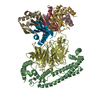
|
|---|---|
| 1 |
|
- Components
Components
| #1: Protein | Mass: 515223.031 Da / Num. of mol.: 1 Source method: isolated from a genetically manipulated source Details: DYNC2H1 with N-terminal SNAPf tag / Source: (gene. exp.)  Homo sapiens (human) / Gene: MGMT, DYNC2H1, DHC1B, DHC2, DNCH2, DYH1B, KIAA1997 / Production host: Homo sapiens (human) / Gene: MGMT, DYNC2H1, DHC1B, DHC2, DNCH2, DYH1B, KIAA1997 / Production host:  References: UniProt: P16455, UniProt: Q8NCM8, methylated-DNA-[protein]-cysteine S-methyltransferase | ||
|---|---|---|---|
| #2: Protein | Mass: 122865.156 Da / Num. of mol.: 1 Source method: isolated from a genetically manipulated source Source: (gene. exp.)  Homo sapiens (human) / Gene: DYNC2I1, WDR60 / Production host: Homo sapiens (human) / Gene: DYNC2I1, WDR60 / Production host:  | ||
| #3: Protein | Mass: 60639.129 Da / Num. of mol.: 1 Source method: isolated from a genetically manipulated source Details: DYNC2I2 (also known as WDR34) with C-terminal Strep tag Source: (gene. exp.)  Homo sapiens (human) / Gene: DYNC2I2, WDR34 / Production host: Homo sapiens (human) / Gene: DYNC2I2, WDR34 / Production host:  | ||
| #4: Protein | Mass: 10934.576 Da / Num. of mol.: 2 Source method: isolated from a genetically manipulated source Source: (gene. exp.)  Homo sapiens (human) / Gene: DYNLRB1, BITH, DNCL2A, DNLC2A, ROBLD1, HSPC162 / Production host: Homo sapiens (human) / Gene: DYNLRB1, BITH, DNCL2A, DNLC2A, ROBLD1, HSPC162 / Production host:  #5: Protein | Mass: 10381.899 Da / Num. of mol.: 2 Source method: isolated from a genetically manipulated source Source: (gene. exp.)  Homo sapiens (human) / Gene: DYNLL1, DLC1, DNCL1, DNCLC1, HDLC1 / Production host: Homo sapiens (human) / Gene: DYNLL1, DLC1, DNCL1, DNCLC1, HDLC1 / Production host:  |
-Experimental details
-Experiment
| Experiment | Method: ELECTRON MICROSCOPY |
|---|---|
| EM experiment | Aggregation state: PARTICLE / 3D reconstruction method: single particle reconstruction |
- Sample preparation
Sample preparation
| Component | Name: Dynein-2 complex / Type: COMPLEX / Entity ID: all / Source: RECOMBINANT |
|---|---|
| Molecular weight | Experimental value: NO |
| Source (natural) | Organism:  Homo sapiens (human) Homo sapiens (human) |
| Source (recombinant) | Organism:  |
| Buffer solution | pH: 7.5 |
| Specimen | Embedding applied: NO / Shadowing applied: NO / Staining applied: NO / Vitrification applied: YES |
| Vitrification | Cryogen name: ETHANE |
- Electron microscopy imaging
Electron microscopy imaging
| Experimental equipment |  Model: Titan Krios / Image courtesy: FEI Company |
|---|---|
| Microscopy | Model: FEI TITAN KRIOS |
| Electron gun | Electron source:  FIELD EMISSION GUN / Accelerating voltage: 300 kV / Illumination mode: FLOOD BEAM FIELD EMISSION GUN / Accelerating voltage: 300 kV / Illumination mode: FLOOD BEAM |
| Electron lens | Mode: BRIGHT FIELD / Nominal defocus max: 3500 nm / Nominal defocus min: 1500 nm |
| Image recording | Electron dose: 50.6 e/Å2 / Film or detector model: GATAN K3 BIOQUANTUM (6k x 4k) |
- Processing
Processing
| CTF correction | Type: PHASE FLIPPING AND AMPLITUDE CORRECTION |
|---|---|
| 3D reconstruction | Resolution: 4 Å / Resolution method: FSC 0.143 CUT-OFF / Num. of particles: 113479 / Details: Global resolution 4.0A / Symmetry type: POINT |
 Movie
Movie Controller
Controller



 PDBj
PDBj

